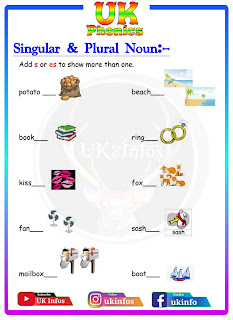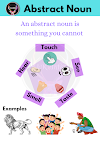UK INFOS
(Abacus, Hindi, Vedic Maths and Phonics Coaching Centre, Peravurani)
Singular and Plural:
🩸Singular and plural are grammatical concepts that denote the number of items or entities being referred to.
🩸Here's a detailed explanation:
Singular
Definition:
- The term "singular" refers to one item or entity.
Usage:
- Singular nouns refer to a single person, place, thing, or idea.
- Singular verbs are used with singular nouns.
Examples:
- Noun: "book" (one book)
- Verb: "runs" (He runs)
Plural
Definition:
- The term "plural" refers to more than one item or entity.
Usage:
- Plural nouns refer to two or more people, places, things, or ideas.
- Plural verbs are used with plural nouns.
Examples:
- Noun: "books" (more than one book)
- Verb: "run" (They run)
Formation Rules
1. Regular Plural Nouns:
- Add -s to the end of the singular form.
- Example: "cat" → "cats"
- Add -es if the noun ends in -s, -x, -z, -sh, or -ch.
- Example: "box" → "boxes"
- Example: "bush" → "bushes"
2. Irregular Plural Nouns:
- These do not follow a standard pattern.
- Example: "man" → "men"
- Example: "woman" → "women"
- Example: "child" → "children"
- Example: "mouse" → "mice"
3. Nouns Ending in -y:
- Change -y to -ies.
- Example: "city" → "cities"
- If the noun ends in a vowel + y, just add -s.
- Example: "toy" → "toys"
4. Nouns Ending in -f or -fe:
- Change -f or -fe to -ves.
- Example: "leaf" → "leaves"
- Example: "wife" → "wives"
- Some exceptions add -s instead.
- Example: "roof" → "roofs"
Agreement with Verbs
- Singular Subject: Use a singular verb.
- Example: "The cat runs fast."
- Plural Subject: Use a plural verb.
- Example: "The cats run fast."
Special Cases
1. Uncountable Nouns:
- Some nouns represent things that cannot be counted individually, like "water" or "information." These are used only in the singular form.
- Example: "We need more information."
2. Collective Nouns:
- These can refer to a group but may be treated as singular or plural depending on the context.
- Example: "The team is winning." (singular)
- Example: "The team are arguing among themselves." (plural)
 |
| (Plural Rules) |
 |
| (Worksheet 1) |
 |
| (Worksheet 2) |
 |
| (Worksheet 3) |
 |
| (Worksheet 4) |
 |
| (Worksheet 5) |
 |
| (Worksheet 6) |
 |
| (Worksheet 7) |
Quiz for you:
👇👇👇👇👇










0 Comments